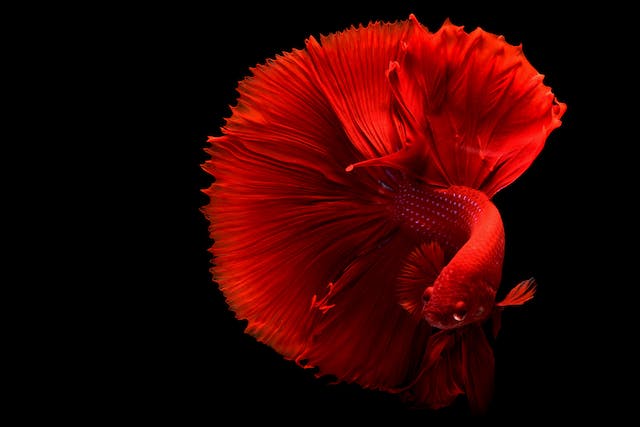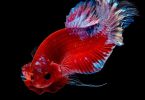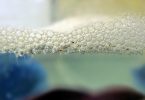Table of Contents
If you have a betta fish, you may be wondering how long they can go without food. Perhaps you’re going on vacation or have a busy week ahead, and you’re concerned about your fish’s well-being. The good news is that betta fish can survive for several days without food, but it’s important to know the risks and take precautions to ensure your fish stays healthy.
Betta fish are hardy creatures and can go up to two weeks without food. However, this doesn’t mean you should leave them without food for that long. A lack of food can weaken their immune system and make them more susceptible to diseases. Additionally, if you have a young or sick betta, they may not be able to go as long without food as a healthy adult. It’s important to monitor your fish and provide them with food as soon as possible if they show signs of distress.
To ensure your betta fish stays healthy, it’s recommended to feed them at least once a day. If you’re going on vacation, consider purchasing an automatic feeder or asking a friend or family member to check on your fish and feed them as needed. It’s also important to keep their tank clean and maintain proper water conditions to prevent stress and illness. By taking these precautions, you can ensure your betta fish stays healthy and happy even when you’re not around to feed them.
Understanding Betta Fish
Betta fish, also known as Siamese fighting fish, are a popular freshwater fish that are native to Southeast Asia. In captivity, they are known for their vibrant colors, long fins, and aggressive behavior towards other fish.
Betta Fish in Captivity
Betta fish are a popular choice for beginners due to their hardiness and ease of care. However, it is important to remember that they are still living creatures that require proper care and attention. In order to keep your betta fish healthy, you will need to provide them with a suitable environment that includes a proper aquarium, filtration system, and regular water changes.
Betta Fish Diet
Betta fish are carnivorous and require a diet that is high in protein. In the wild, they primarily feed on insects, larvae, and small crustaceans. In captivity, their diet can consist of a variety of foods including pellets, brine shrimp, bloodworms, and worms.
It is important to provide your betta fish with a varied diet that meets their dietary needs. Betta pellets and flakes are readily available at most pet stores and can be used as a staple food. However, it is important to supplement their diet with other foods such as mosquito larvae, daphnia, and other insects to ensure they are receiving a balanced diet.
When feeding your betta fish, it is important to avoid overfeeding. Betta fish have small stomachs and can become bloated if they eat too much. A good rule of thumb is to feed your betta fish 2-3 pellets twice a day, or an amount that they can consume within 2-3 minutes.
In conclusion, understanding the dietary needs of your betta fish is essential for their overall health and well-being. By providing them with a varied diet that meets their nutritional requirements, you can ensure that they live a long and healthy life.
Feeding Betta Fish
Feeding your betta fish is an important aspect of their care and well-being. Betta fish can survive for several days without food, but it is important to establish a feeding schedule to ensure they receive proper nutrition.
Feeding Schedule
Betta fish should be fed once or twice a day, with only a small amount of food each time. Overfeeding can lead to constipation, weight gain, and malnutrition. It is important to monitor your betta’s weight and adjust their feeding schedule accordingly.
Food Types
Betta fish can eat a variety of foods, including pellets, brine shrimp, bloodworms, daphnia, insects, and larvae. Betta pellets and flakes are specifically formulated for betta fish and provide a balanced diet. Mosquito larvae can also be a good source of nutrition, but make sure they are collected from a clean source.
Overfeeding and Underfeeding
Overfeeding your betta fish can lead to health issues, such as constipation and weight gain. Underfeeding can lead to malnutrition and weight loss. It is important to establish a feeding schedule and monitor your betta’s weight to ensure they are receiving the proper amount of food.
In conclusion, feeding your betta fish is an important aspect of their care. Establishing a feeding schedule and monitoring their weight can help ensure they receive proper nutrition and avoid health issues. Betta fish can eat a variety of foods, but it is important to avoid overfeeding and underfeeding.
Betta Fish Without Food
If you’re a betta fish owner, you might be wondering how long your fish can survive without food. Betta fish are known for their ability to go without food for several days, but how long can they really go without food? In this section, we’ll explore the topic of betta fish and food deprivation.
Surviving Without Food
Betta fish can survive for up to two weeks without food, but this is not recommended. Going without food for this long can lead to malnutrition, weight loss, and other health problems. In the wild, betta fish are opportunistic feeders and may go for several days without food, but they also have access to a variety of food sources.
If you plan on leaving your betta fish without food for more than a day or two, it’s important to make sure they have access to clean water and a stress-free environment. You can also consider using an automatic feeder to ensure your fish gets regular feedings while you’re away.
Effects of Starvation
When a betta fish goes without food for an extended period of time, they may experience a variety of negative effects. One of the most noticeable effects is a dulling of their color. Betta fish are known for their vibrant colors, but when they are malnourished, their colors can become faded and less vibrant.
In addition to color changes, betta fish may also become more aggressive when they are hungry. This is because hunger can cause stress and anxiety, which can lead to aggressive behavior. Weight loss is another common effect of starvation in betta fish. If your fish is not getting enough food, they may start to lose weight and become weaker over time.
Overall, it’s important to make sure your betta fish is getting enough food to stay healthy and happy. While they can survive for a short period of time without food, it’s not recommended to leave them without food for more than a day or two. Providing your fish with a balanced diet and a stress-free environment will help ensure they stay healthy and happy for years to come.
Leaving Betta Fish Alone
If you are planning to leave your Betta fish alone for a few days, it is essential to ensure that they have enough food and a clean environment to thrive. Here are some things to keep in mind:
During Vacation
If you are going on vacation, you may be tempted to skip feeding your Betta fish altogether. However, this is not recommended, as Betta fish can only go without food for a few days before they start to suffer from malnutrition. To ensure that your fish get enough food while you are away, consider using an automatic fish feeder or feeding blocks.
Tank Conditions
The condition of your Betta fish’s tank is also crucial when it comes to leaving them alone. Make sure that the tank is clean and that the water quality is good. If you have an unfiltered tank, you may need to change the water more frequently to maintain good water conditions. Also, ensure that the tank is the right size for your fish, and that the temperature is appropriate for their needs.
Health Concerns
Leaving your Betta fish alone can also lead to health problems. Stress levels can increase, which can lead to lethargy, constipation, dull color, weight loss, and aggression. To prevent these issues, ensure that your fish are in good health before you leave, and that their environment is optimal. If you are concerned about your fish’s health, consider asking a friend to check on them or hiring a fish sitter.
In summary, leaving your Betta fish alone is possible, but it requires careful preparation and planning. Ensure that your fish have enough food and a clean environment, and consider using an automatic fish feeder or feeding blocks if you are going on vacation. Also, monitor your fish’s health and stress levels to prevent any health problems while you are away.
Caring for Betta Fish Fry
Betta fish fry are delicate creatures that require special care to ensure their survival. If you’re new to breeding betta fish, it’s important to understand the basics of caring for betta fish fry.
Feeding Betta Fish Fry
Feeding betta fish fry can be a bit tricky, as they have very small mouths and require special food. When they first hatch, betta fish fry will still have an egg sack attached to their bellies. This egg sack will provide them with nutrients for the first few days of their life.
After the egg sack has been absorbed, it’s important to start feeding your betta fish fry. You can start by feeding them infusoria, which are tiny organisms that can be found in stagnant water. You can also feed them newly hatched brine shrimp or microworms.
It’s important to establish a feeding schedule for your betta fish fry. You should feed them small amounts of food several times a day, rather than one large meal. Overfeeding can lead to health problems, so it’s important to be careful not to give them too much food.
In summary, caring for betta fish fry requires special attention to their feeding needs. By providing them with the right type of food and establishing a feeding schedule, you can help ensure their survival and growth.
Conclusion
In conclusion, betta fish can go without food for up to two weeks without any significant harm to their well-being. However, it is important to note that this is not an ideal situation for your fish and should only be done in emergencies or under the guidance of a veterinarian.
While betta fish can survive for a short period without food, it is essential to ensure that they receive proper nutrition on a regular basis. Overfeeding can also be harmful to your fish and can lead to health problems such as swim bladder disease.
To maintain the health and well-being of your betta fish, it is recommended that you feed them small amounts of high-quality food once or twice a day. This will provide them with the necessary nutrients to thrive and keep them healthy.
In summary, while betta fish can survive for up to two weeks without food, it is crucial to ensure that they receive proper nutrition regularly to maintain their health and well-being.







